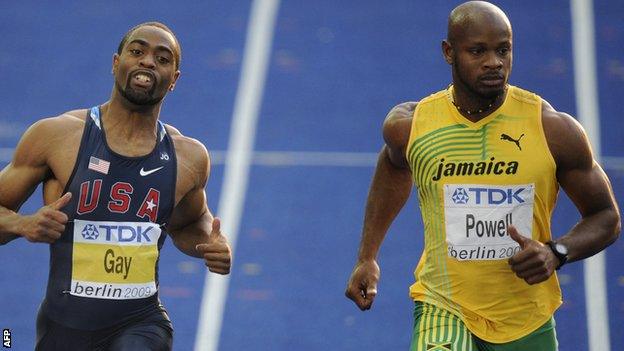Tyson Gay and Asafa Powell: Faith in athletics on the line
- Published
- comments

A decade on from the Balco scandal,, external athletics is facing another defining moment.
Five-time Olympic medallist Marion Jones, external was the biggest name to be disgraced when she admitted to taking drugs linked to The Bay Area Laboratory Co-operative (Balco).
Now, it is American Tyson Gay and Jamaican Asafa Powell who are in the spotlight for failing drugs tests.
The sport's governing body, the IAAF, says the latest doping scandals enhance rather than diminish the credibility of track and field. The problem for athletics is that trust in the sport and its athletes was already paper thin.
Repeated revelations of cycling's industrial-scale doping have obscured the truth for athletics that - even after a London Olympics which largely steered clear of damaging drugs controversies - it is still a problem that has never gone away.
Over the past few months there have been a series of positive tests and doping investigations.
In Kenya, the IAAF and the Kenyan Athletics Federation set up an inquiry into claims that there was widespread drug use in the country's distance-running training camps. A temporary blood-testing lab has been set up to try and crack down on possible cheating.
In Russia, there are 42 athletes currently suspended for doping. With the World Championships in Moscow just a month away, this is a huge embarrassment.
In Turkey, eight athletes are under investigation but reports suggest the number under suspicion could be much higher than that.
And, perhaps most damaging of all, Jamaica are now facing difficult questions about doping after three of their biggest names tested positive for banned substances. Veronica Campbell Brown, the two-time Olympic 200m champion, has already been suspended for using a diuretic well known as a masking agent while Powell and Sherone Simpson have both produced an adverse finding.
In the cases of Powell and Simpson a second test, or B sample, must be verified before it is confirmed that they will face a disciplinary charge.
Local reports in Jamaica suggest another three athletes have also tested positive, although this has not been confirmed by the Jamaican Athletics Administrative Association.
For years now Jamaica have had to counter claims that their emergence as one of track and field's super powers was in any way linked to banned drugs. The recent rash of cases will not do anything to remove the suspicions.
But by far the most damaging blow for athletics has been the news that Gay, the fastest man in the world this year and the 2007 world 100m champion, tested positive in May for an unidentified banned substance.
As with Powell and Simpson, Gay is now awaiting the results of tests on his B sample. If it confirms the A sample and he is suspended he will be the most high-profile name in track and field to be banned since Justin Gatlin back in 2006., external
There are two schools of thought about all this.
The first is that cheating is now so embedded in athletics that whatever measures the authorities take, there will always be those who are willing to break the rules to win.
The other is that the IAAF and the anti doping agencies around the world are finally getting serious about the problem in athletics.
Remember, the Balco affair which took down huge numbers of American athletes including the three-time Olympic gold medallist Jones, was driven by federal investigators in America.
Blood passports and the ability to re-test old samples have potentially changed the game and it seems there is a real willingness in the sport to get to grips with the issue.
The difficulty for athletics is that it may have already passed the point of no return, the point where scandals of this nature are greeted with a shrug rather than shock.
- Published15 July 2013
- Published15 July 2013
- Published15 July 2013
- Published15 July 2013
- Published25 April 2013